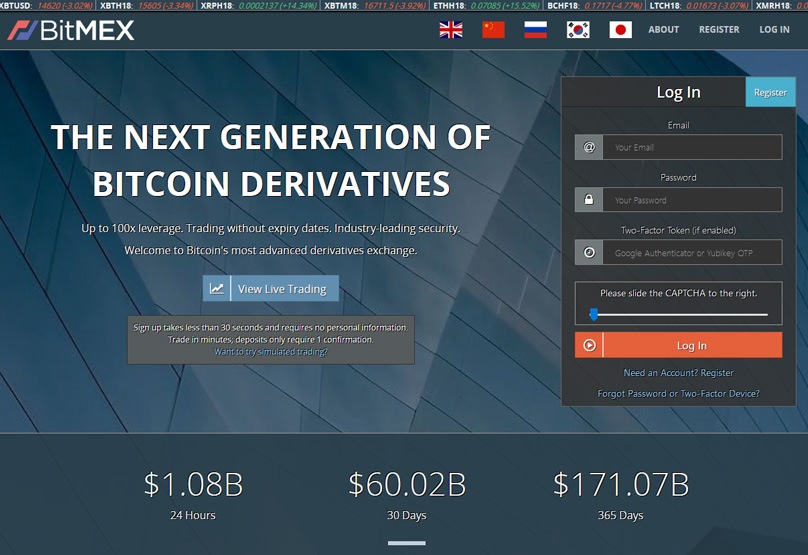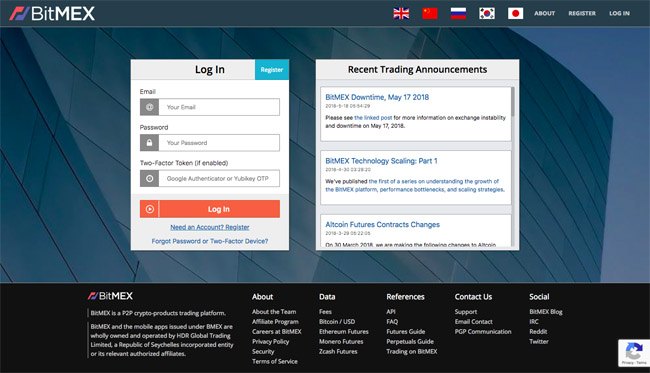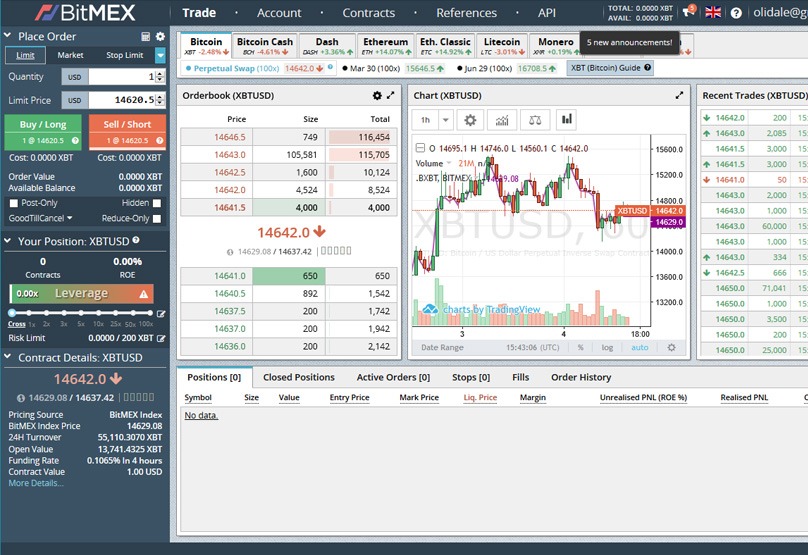BitMEX, which means Bitcoin Mercantile Exchange and has nothing to do with Mexico, is a cryptocurrency derivatives trading platform that was founded in 2014 by three former investment bankers – Arthur Hayes, Samuel Reed, and Ben Dolo. BitMEX operates out of Hong Kong, but is registered as a company in the Seychelles. It shows up as the largest Bitcoin Exchange on Coinmarketcap.com, with a daily trading volume of nearly $3 billion, although this is somewhat deceptive as the exchange actually deals with derivatives, and no actual cryptocurrencies are exchanged when trading with BitMEX.
BitMEX accepts deposits of Bitcoin, and this is the only Bitcoin that actually changes hands, or wallets if you like. It was created as a cryptocurrency exchange that focuses on complex financial derivatives, and allows for margin trading and high leverage, which can lead to massive profits or soul crushing losses. It is not a suitable exchange for new traders at all, and should be used only with caution by experienced cryptocurrency traders who are familiar with the impact that leverage has on trading accounts.
Signing Up at BitMEX
As with any other trading platform, the first step to trading is to create an account. BitMEX makes this very easy, and all that’s needed to register is a valid email address. Users can of course use anonymous email addresses, which has made BitMEX popular with the privacy focused traders. You must be at least 18 years old to create an account, and once you register you’ll receive an email to confirm your email address. Once that’s done you can begin trading, and as much as you like since BitMEX has no trading limits.
One thing to not is that BitMEX does not accept U.S. based traders, and even uses IP Pchecks to ensure you aren’t visiting the site from the U.S. Those who try to access BitMEX from the U.S. will get a “403 Forbidden” error screen rather than the BitMEX main screen. While it’s true that some users will get around this by using a VPN service, I don’t recommend you do this, as all your funds could be at risk if your account gets flagged and shut down. There are plenty of alternative exchanges you can use within the U.S. to trade cryptocurrencies, albeit not with the degree of leverage you’ll get at BitMEX.
Trading with BitMEX
While it’s derivatives that are being traded on BitMEX, it’s hard to tell the difference, and you are able to trade a number of cryptocurrencies against fiat currencies like the U.S. dollar, the Chinese yuan and the Japanese yen. There are also a number of cryptocurrencies available on the platform besides Bitcoin. These include Bitcoin Cash, Ethereum, Litecoin, DASH, Monero, Ripple, Ethereum Classic, Zcash and Tezos.
If you’ve done any trading before you’ll probably find the BitMEX platform to be quite intuitive and easy to use. It’s still not meant for beginning traders though, and experienced traders will find it to be a bit clunky when compared with the updated platforms at exchanges like Binance and Bittrex.
After registering and logging into the platform you can click on the “Trade” link to see all the available traded pairs.
Clicking a specific pair will bring up more detailed information, such as recent trades and an order slip, as well as the order book for the pair. The order book has three columns of information: the bid value, the quantity offered and the total value of all open orders, both short and long.
You are able to reorder, add and remove widgets in the trading platform, fully customizing your view of the market. You can also take advantage of built-in TradingView charting, which gives you probably the most powerful charting available for cryptocurrencies.
Once a trade is placed it can easily be seen via the tabs in the platform interface. You can quickly switch to see active orders, any stops you have in place, see which orders have been filled, and lookup your complete order history. It is also simple to cancel any open order when in the active orders and stop tabs by clicking the link that says “Cancel”. Your open orders will also let you know if the trade is currently profitable or at a loss.
BitMEX uses a method called auto-deleveraging which BitMEX uses to ensure that liquidated positions are able to be closed even in a volatile market. Auto-deleveraging means that if a position bankrupts without available liquidity, the positive side of the position deleverages, in order of profitability and leverage, the highest leveraged position first in queue. Traders are always shown where they sit in the auto-deleveraging queue, if such is needed.
That said, there have been complaints online claiming BitMEX will make the platform inaccessible when there are large or rapid market moves. Users have said they are unable to log in during such times, or if they’re already logged in they get error messages indicating that the platform is overloaded, or that the API is inaccessible. Some users claim BitMEX does this on purposes, and that substantial client losses have occurred because of this behavior.
BitMEX offers mobile trading, but only for Android users. There is no iOS app available at this time, and the Android app is said to be buggy. It’s recommended that you only use the site on a desktop or laptop computer if at all possible.
As an advanced trading platform, BitMEX gives its clients a large variety of order types that can be used to create the perfect position:
- Limit Order (the order is filled if the requested price is met);
- Market Order (the order is executed immediately at current market price);
- Stop Limit Order (like a stop order, but allows users to set the order price to execute at once the stop is triggered);
- Stop Market Order (this is a stop order that does not enter the order book. It remains unseen until triggered);
- Trailing Stop Order (similar to a stop market order, but with a market trailing value that is used to place the market order);
- Take Profit Limit Order (similar to a stop order, but sets a target price to close the position at a profitable level);
- Take Profit Market Order (same as the previous type, but in this case, the order triggered will be a market order, and executed immediately at the market price)
All of the crpytocurrency pairs on the platform can be traded with margin, allowing traders to leverage their trades and hopefully make greater profits.
BitMEX Futures and Swaps
A futures contract is a type of derivative contract that gives the holder the right to buy or sell and asset in the future at a predetermined price. BitMEX uses futures contracts that allow clients to use as much as 100x leverage on certain contracts. Futures are settled at their expiration date.
A swap is similar to a future, however it never expires and there is never a settlement. Instead it rolls over into a new contract. Swaps are also sometimes preferable because they tend to remain closer to the underlying reference index price, unlike futures, which can diverge significantly from the underlying index price.
You can also trade binary options through BitMEX. These are predictive contracts which are binary in nature in that they only have two possible outcomes. You make your investment based on your predicted outcome to an event, and if you’re right you collect as much as 100%, but if you’re wrong you lose your entire investment. It’s a quick, but dangerous way to double your money. Previous binary bets included one in March on whether the Winklevoss Bitcoin ETF would be approved. In April there was a binary option relating to whether Segregated Witness will be activated on the longest Bitcoin chain.
BitMEX Leverage
BitMEX offers up to 100x leverage on some contracts, greatly magnifying potential profits or losses for traders. Leverage allows a trader to place a trade that is much larger than their existing balance and is achieved through margin trading, where the broker lends the funds necessary to make the leveraged trade.
BitMEX uses two types of margin trading:
- Isolated Margin Trading – Allows a trader to select the amount of funds that will be used to maintain open positions. This protects a user from a complete loss of all trading funds.
- Cross Margin Trading – Specifies that all the funds in the client’s wallet should be used to maintain positions. This offers the greatest profit potential, but is also dangerous because a users entire account could be wiped out if prices move against them.
Leverage levels are set using a slider on the platform, with the maximum 100x leverage only available when trading Bitcoin and Bitcoin Cash. This is very high leverage, even in traditional markets, and for the volatile cryptocurrencies it can be especially dangerous. Most exchanges offer leverage of 20x or less, if they offer leveraged trading at all. As a comparison, forex brokers are only permitted to offer 50x leverage to U.S. residents.
BitMEX Fees
BitMEX has a straightforward fee schedule for futures trades. Fees and maximum leverage amounts can be seen in the chart below.
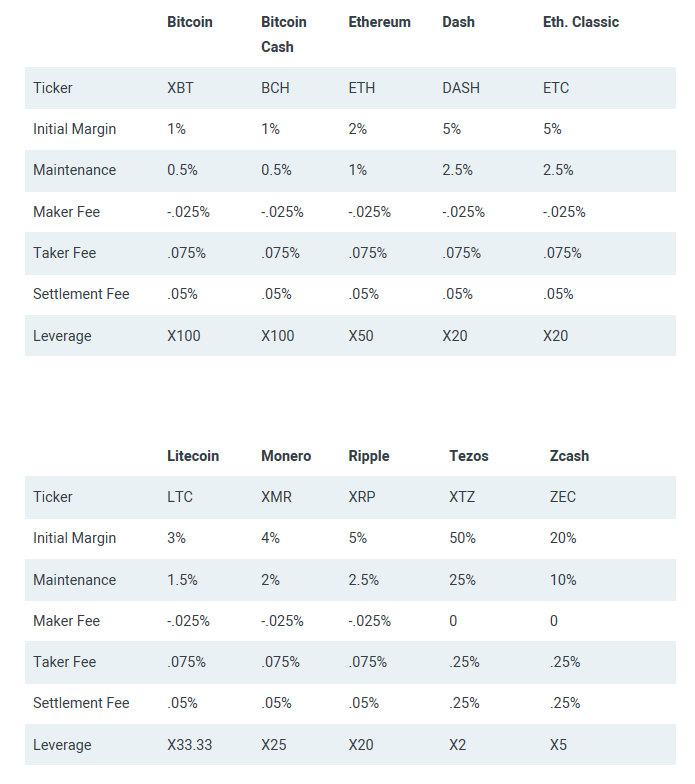
Note that certain orders, such as hidden or iceberg orders, have additional fees. On a hidden order the client must pay the taker fee until the hidden order has been completely executed. After that the order is a normal order, with the client receiving the maker rebate.
Deposits and Withdrawals at BitMEX
There are no withdrawal or deposit fees charged by BitMEX. There will still be network fees charged for Bitcoin withdrawals, and these are based on the minimum network fee at the time, given the network load.
Deposits at BitMEX can only be made with Bitcoin, and due to this Bitcoin is used as the collateral for all contracts, even those that don’t involve Bitcoin. There is a minimum deposit of 0.001 BTC. BitMEX has no limits on withdrawals, but like deposits, the withdrawals can only be made in Bitcoin. Making a withdrawal from BitMEX is as simple as inserting the receiving wallet address and amount and initiating the transfer.
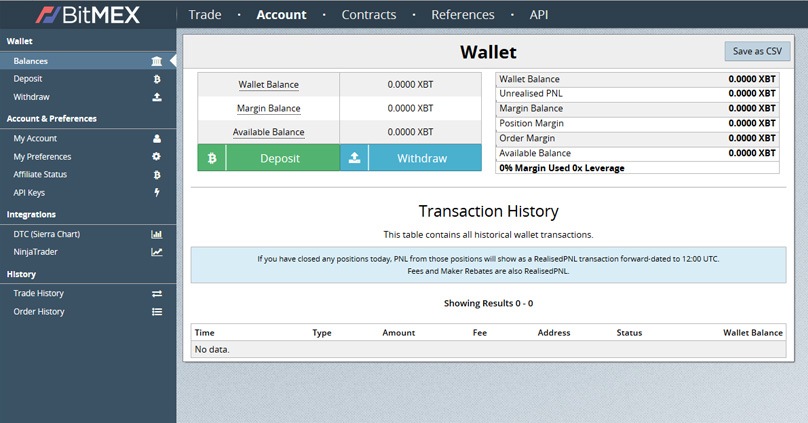
You can make a deposit at any time, but withdrawals are manually processed once per day. This manual processing has been instituted to increase the security of the platform, since it gives users time to cancel any potentially fraudulent withdrawal requests. All withdrawals generate a confirmation email to the registered email address.
Is BitMEX Safe?
Given the huge volumes processed by BitMEX, I certainly hope it’s safe. The platform is widely considered to have excellent security measures in place, including the above mentioned manual withdrawal processing. BitMEX also uses multi-signature schemes for deposits and withdrawals that have limited access by the BitMEX partners. Two-factor authentication is available for all client accounts, and hardware tokens are used in conjunction with Amazon Web Services.
Risk checks have been implemented which require all account holdings must equal zero or trading is immediately halted. Private keys are never stored in the cloud and all deposit addresses are externally verified to ensure they hold the matching keys. If a mismatch is found the system immediately shuts down.
BitMEX also uses cutting edge bank level software, with the platform itself being written in kdb+. This is a database and toolset used by international banks for high frequency trading applications. This also seems to make the BitMEX platform faster and more reliable than its competitors.
Deposits are verified by email notification and all email communication utilizes PGP encryption.
BitMEX has never been hacked, and no client funds have ever been lost.
BitMEX Customer Support
The first line of support at BitMEX is their FAQ document, which can be found here. The FAQ and knowledgebase are widely acknowledged as not being extremely helpful, but can direct users to the appropriate support channels.
Those additional support channels include email, a ticketing system, and social media accounts. Support is offered 24/7 and is said to be quite good when compared with other cryptocurrency exchanges. Typical response tome for customer support is 1 hour or less, and responses are typically helpful and not automated responses.
BitMEX also offers helpful trading guides which can be accessed here.
In Conclusion
BitMEX seems to take both security and customer service very seriously, and there have been few online complaints related to either. The most common complaints relate to the complexities of futures and swaps, and older complaints referred to low platform liquidity, but that’s no longer an issue. More recent complaints revolve around potential manipulation by BitMEX, with the exchange becoming unavailable during periods of high volatility, or rapid price moves.
All of that notwithstanding, BitMEX is not a platform meant for beginning cryptocurrency traders. The use of futures, swaps, binary options and high leverage all make this a platform suited to those with experience in cryptocurrency trading, or other financial markets. Additionally, the platform itself can lead to some confusion for those unfamiliar with advanced trading techniques.
Experienced traders will definitely appreciate the broad range of tools available, and the high leverage available, but new traders should tread cautiously, and perhaps consider getting experience elsewhere before venturing on to BitMEX.
